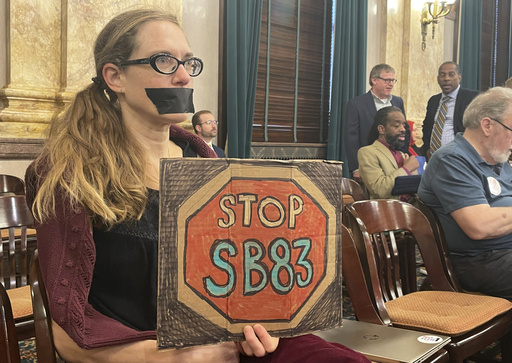
COLUMBUS, Ohio — On Wednesday, the Ohio Senate, controlled by the Republican party, passed a controversial bill that aims to eliminate diversity, equity, and inclusion (DEI) programs at public colleges and universities in the state. This legislation also seeks to reduce certain collective bargaining rights and tenure protections for faculty members. The proposal received significant opposition from over 1,000 students, educators, and various stakeholders who voiced their concerns regarding the ramifications of such a bill.
Senate Bill 1 includes provisions that would require educational institutions to refrain from influencing students’ opinions on “controversial” subjects. Additionally, it seeks to revoke the voting rights of student trustees at Ohio State University, mandate a three-hour civics education course for all college students in Ohio, and institute numerous other administrative and programmatic adjustments. Higher education institutions found to be in non-compliance with these measures could potentially face the loss of state funding.
The Senate approved the bill by a vote of 21-11, marking its second passage in similar form since 2023. The next step is for the bill to be considered by the Ohio House, where it did not advance in the previous session. However, changes in the political landscape due to a new speaker may affect its prospects.
The bill’s sponsor, Republican Senator Jerry Cirino, argued that the legislation is necessary to ensure “intellectual diversity” on college campuses, claiming it would foster an environment more welcoming to conservative viewpoints. He criticized the current state of DEI initiatives, asserting that they have become a form of institutional discrimination. Cirino highlighted concerns that those not adhering to DEI norms face discrimination and called for a halt to the funding of what he described as oversized DEI organizations.
In strong contrast, Democratic senators actively challenged the bill, with a number of Black senators delivering especially passionate responses. Senator Hearcel Craig, a Democrat from Columbus, remarked on recent white supremacist rallies in Columbus and Cincinnati, emphasizing the crucial role that colleges and universities must play in conveying the full narrative of Black history. He argued that DEI initiatives not only assist Black students but also support veterans, women, and individuals with disabilities, stating that all students who benefit from these programs have earned their opportunities through hard work.
Kristina Roegner, chair of the Senate Higher Education Committee, defended the notion that institutions of higher learning should be spaces free from prejudice, allowing students to express themselves and consider diverse perspectives without fear of repercussions from faculty. She criticized what she perceives as a predominance of liberal bias in higher education, suggesting that this reality necessitates legislative action to create a more balanced environment.
Meanwhile, Democratic Senator Bill DeMora denounced the bill as “anti-union and anti-free speech,” warning that its enactment could exacerbate the already growing political divisions in society. He expressed concern that the broad definition of “controversial” could allow individuals to report any professor for any reason, thereby endangering institutional funding. DeMora echoed the sentiment shared by many of his colleagues, claiming such measures could signal the end of higher education as it currently exists.
In a separate statement, Ohio’s newly appointed Lt. Governor Jim Tressel, a former football coach with a lengthy career in higher education, commented on the bill’s implications. While he refrained from taking a definitive stance on the proposed legislation, Tressel acknowledged the importance of fostering diversity within educational institutions. He revealed that as president of Youngstown State University, he initiated efforts to promote understanding and acceptance among students from diverse backgrounds. Tressel described his belief that “university” symbolizes both “unity and diversity,” allowing individuals from varied backgrounds to congregate, learn from one another, and gain insight into different cultures and perspectives.

